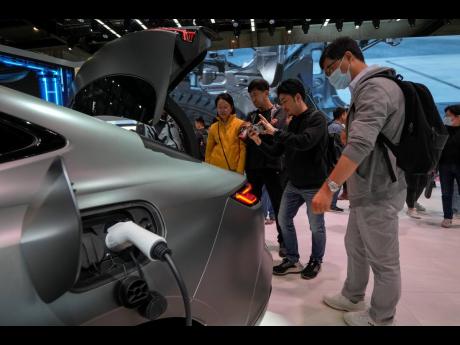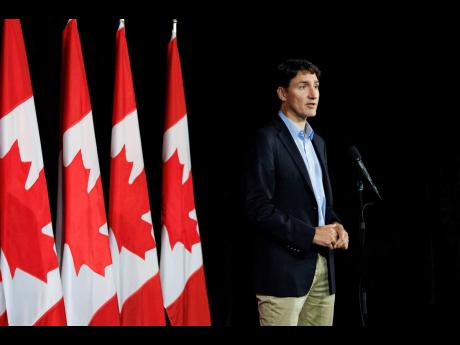China accuses Canada of protectionism over 100% tariffs on electric vehicles
China on Tuesday accused Canada of protectionism after Prime Minister Justin Trudeau’s government imposed a 100 per cent tariff on imports of Chinese-made electric vehicles, matching US duties on Chinese-made EVs.
The Chinese Commerce Ministry said in a statement the tariffs would disrupt the stability of global industrial and supply chains, severely impact China-Canada economic and trade ties and damage the interests of enterprises in both countries.
“China is strongly dissatisfied and firmly opposes this,” the statement read.
“Canada claims it supports free trade and the multilateral trading system based on (World Trade Organization) rules, but it blatantly violated WTO rules and announced it will take unilateral tariff measures by blindly following individual countries. It is typical trade protectionism,” it added.
The ministry urged Canada to “immediately correct its wrong practices” and said that Beijing would take any necessary measures to defend the rights and interests of Chinese companies.
Canada’s announcement came after encouragement by the United States’ national security adviser Jake Sullivan during a meeting with Trudeau and Cabinet ministers on Sunday. Sullivan began his first visit to Beijing on Tuesday.
Canada announced Monday it is launching a 100 per cent tariff on imports of Chinese-made electric vehicles, matching US tariffs imposed over what Western governments say are China’s subsidies that give its industry an unfair advantage.
The announcement came after encouragement by US national security advisor Jake Sullivan during a meeting with Canadian Prime Minister Justin Trudeau and Cabinet ministers Sunday. Sullivan is making his first visit to Beijing on Tuesday.
Trudeau said Canada also will impose a 25 per cent tariff on Chinese steel and aluminum. “Actors like China have chosen to give themselves an unfair advantage in the global marketplace,” he said.
One of the Chinese-made EVs imported into Canada is from Tesla, made at the company’s Shanghai factory, though the US company could avoid the tariff by switching to supplying Canada from factories in the US or Germany.
Chinese brands are not yet a player in Canada. However, Chinese EV giant BYD established a Canadian corporate entity last spring and has indicated its intent to try and enter the Canadian market as early as next year.
Chinese officials are likely to raise concerns about the American tariffs with Sullivan as Beijing continues to repair its economy after the COVID-19 pandemic. US President Joe Biden in May slapped major new tariffs on Chinese electric vehicles, advanced batteries, solar cells, steel, aluminum and medical equipment.
“The US does believe that a united front, a coordinated approach on these issues benefits all of us,” Sullivan told reporters on Sunday.
Biden has said Chinese government subsidies for EVs and other consumer goods ensure that Chinese companies don’t have to turn a profit, giving them an unfair advantage in global trade.
Chinese firms can sell EVs for as little as US$12,000. China’s solar cell plants and steel and aluminum mills have enough capacity to meet much of the world’s demand. Chinese officials argue their production keeps prices low and would aid a transition to the green economy.
“We’re doing it in alignment, in parallel, with other economies around the world that recognise that this is a challenge that we are all facing,” Trudeau said of the new tariffs. “Unless we all want to get to a race to the bottom, we have to stand up.”
Deputy Prime Minister Chrystia Freeland said Canada also will launch a 30-day consultation about possible tariffs on Chinese batteries, battery parts, semiconductors, critical minerals, metals and solar panels.
“China has an intentional state-directed policy of overcapacity and oversupply designed to cripple our own industry,” Freeland said. “We simply will not allow that to happen to our EV sector, which has shown such promise.”
The Chinese Embassy said Ottawa disregarded Beijing’s repeated objections and that the move will damage trade and economic cooperation.
“This move is typical trade protectionism and politically-motivated decision, which violates the World Trade Organization rules and goes against Canada’s traditional image as a global champion for free trade and climate change mitigation,” the embassy said in an emailed statement. “China will take all necessary measures to safeguard the legitimate rights and interests of Chinese enterprises.”
Canada “had to go with the US position, when you think about the economic integration that we have with the US More than 75 per cent of our exports go to the US,” said a former Canadian ambassador to China, Guy Saint-Jacques.
Saint-Jacques said Canada can expect retaliation from China in other industries, adding that barley and pork are candidates because the Chinese can source them from other countries.
“China will want to send a message,” he said.
Chinese officials are likely to raise concerns about the American tariffs with Sullivan as Beijing continues to repair its economy, which was hit by the COVID-19 pandemic. In May, US President Joe Biden slapped major new tariffs on Chinese electric vehicles, advanced batteries, solar cells, steel, aluminum and medical equipment.
A Chinese Foreign Ministry spokesperson on Tuesday urged Canada to “not politicise economic and trade issues.”
“China’s burgeoning electric vehicle industry is the result of continuous technological innovation, a well-established industrial and supply chain, and full market competition,” spokesperson Lin Jian said.
AP


